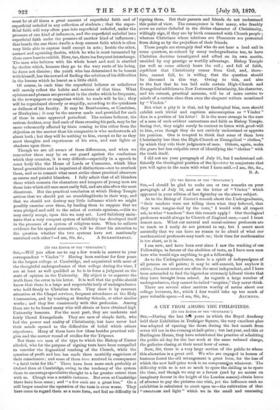[TO THE EDITOR OF THE "SPECTATOR.']
SIR,—Will you allow me to say a few words in answer to your correspondent " Vindex "? Having been resident for four years in the largest college at Cambridge, and acquainted with most of the thoughtful undergraduates of that college during the time, I am at least as well qualified as he is to form a judgment on the state of opinion in the University. My object is to separate the truth from the error in his letter. It is well that the public should know that there is a large and respectable body of undergraduates who hold firmly to Christian truth. They show it by reverent attention at the Chapel services, frequent attendance at the Holy Communion, and by teaching at Sunday Schools, or other similar works ; and they live consistently with this profession. Among them are to be found many who will obtain or have obtained high University honours. For the most part, they are moderate and fairly liberal Evangelicals. They are men of simple faith, who feel the power and reality of Christianity, but have never had their minds opened to the difficulties of belief which others experience. Many of them have few ideas besides practical reli- gion and the narrow round of studies for the Triposes.
But there are men of the type to which the Bishop of Exeter alluded, who for the purpose of signing tests have been compelled to consider the dogmatical teaching of the Church, while the question of profit and loss has made them morbidly suspicious of their consciences ; and some of them have received in consequence " a fatal twist for life." There have been more such probably at Oxford than at Cambridge, owing to the tendency of the system there to encourage speculative thought to a far greater extent than with us. Clough was a notable instance. But even at Cambridge there have been some ; and " a few such are a great loss." On a still larger number the operation of the tests is even worse. They have come to regard them as a mere form, and feel no difficulty in
signing them. But their parents and friends do not understand this point of view. The consequence is that many, who frankly avow an entire disbelief in the divine character of Christianity, willingly sign, if they are by birth connected with Church people ; whereas Christians whose relations are Dissenters are prevented from doing so by the prejudices of their friends.
Those people are strangely deaf who do not hear a loud call in some quarters, re-echoed by many undergraduates too, to have Christian doctrine investigated and sifted on its own merits, unaided by any prestige or worldly advantage. Bishop Temple (as well as some others) hears the call ; and full of faith, confident that Christianity comes from God, and,, there- fore, cannot fall, he is willing that the question should be discussed in this way. Owing to this, and also to the fact that he has laid aside certain High-Church and Evangelical additions to New Testament Christianity, his character, and his earnest, practical sermons, will be of more service to minds of a certain class than even the eloquent writers mentioned by " Vindex."
But what a pity it is that, led by theological bias, men should exhibit such trivial and captious misconception as " Vindex " does in a portion of his letter ! It is the more strange in the case of a man of such evident earnestness and faith as Bishop Temple. Seeing that, they might surely be content to listen with good-will to him, even though they do not entirely understand or approve his position. One is tempted to think that some of them love Christianity less than the High-Church or Evangelical " clothes," by which they rule their judgments of men. Others, again, make the grave but less culpable error of identifying the " clothes" with the truth itself.
I did not see your paragraph of July 16, but I understand suf- ficiently the theological position of the Spectator to conjecture that you will agree in the main with what I have said.—I am, Sir, &c., B. A.






























 Previous page
Previous page